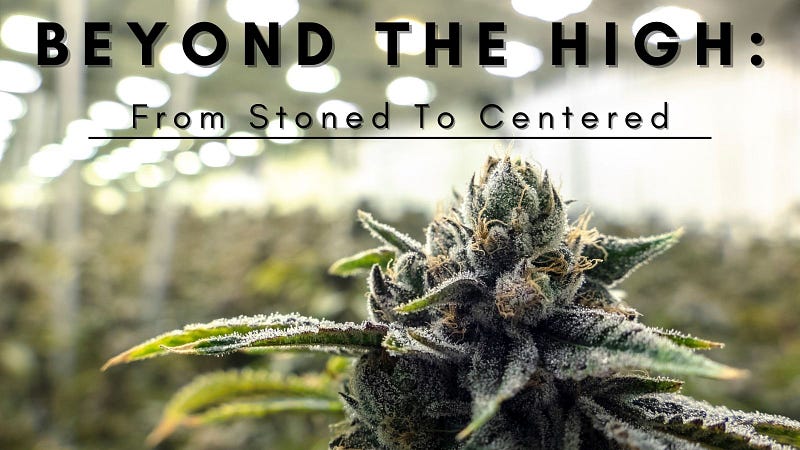# The Transformative Power of Mindfulness and Cannabis
Written on
Chapter 1: Understanding Cannabis and Mindfulness
The remarkable ways in which marijuana and mindfulness can enhance your well-being and enrich your self-awareness are worth exploring. This discussion delves into the profound relationship between the cannabis plant and mindfulness practices, revealing how they can be harnessed for personal development and transformation.
Historically, cannabis has been linked to the notion of "mindless consumption," with many individuals using it primarily to escape reality or simply to achieve a euphoric state. However, a recent trend has emerged that advocates for "intentional cannabis use," focusing on consuming the plant with mindfulness and purpose.
While opinions vary regarding its impact on mental and physical health, some people see cannabis as a valuable tool for relaxation and stress relief, while others view it as a potential source of distraction that could hinder motivation and cognitive function.
This paragraph will result in an indented block of text, typically used for quoting other text.
Section 1.1: The Benefits of Cannabis
One frequently mentioned advantage of cannabis is its ability to alleviate stress and anxiety. This effect can be attributed to cannabinoids, compounds found in cannabis that interact with the endocannabinoid system—a system responsible for regulating pain, mood, and appetite.
To learn more about the endocannabinoid system, check this resource. The relaxing and euphoric feelings induced by cannabis make it particularly helpful for those suffering from chronic pain or discomfort. For instance, it has been recognized as an effective treatment for conditions like multiple sclerosis, which can cause severe muscle spasms and fatigue, and for individuals with Parkinson’s disease, where it helps reduce tremors and improve sleep quality.
With a rise in patients seeking alternatives to opioids for chronic pain management, many are turning to medical marijuana as a viable option. Additionally, cannabis may assist in alleviating symptoms of PTSD and other trauma-related disorders.
Another noteworthy benefit of cannabis is its potential to foster creativity and self-exploration. Users often report enhanced cognitive flexibility, enabling them to think creatively and generate new ideas. Mindful consumption of cannabis allows individuals to align its use with their personal values and objectives.
For example, someone who prioritizes relaxation may choose to use cannabis as a form of unwinding after a hectic day, while another who values creativity might utilize it to inspire artistic expression. Moreover, its anti-inflammatory properties can be advantageous for conditions such as Crohn’s disease, Irritable Bowel Syndrome, and other inflammatory bowel diseases.

Section 1.2: Concerns and Misconceptions
Despite its many benefits, there are still concerns surrounding cannabis use. While the risk of addiction is lower than that associated with substances like opioids or alcohol, some individuals—especially those with a family history of addiction or pre-existing mental health conditions—may be at increased risk. According to the National Institute on Drug Abuse (NIDA), only about 9% of users develop an addiction to marijuana.
It is important to recognize that marijuana addiction is relatively uncommon, and most users do not experience addiction issues. On the other hand, synthetic marijuana is often sought after to circumvent drug tests, but it poses significant health risks, including severe side effects and addiction potential.
Additionally, the stigma surrounding cannabis often labels it as a "gateway drug," implying that it leads to the use of more dangerous substances. Research, however, indicates that this is not the case; many individuals use cannabis without progressing to harder drugs. In fact, some studies suggest it may serve as an "exit drug," assisting individuals in reducing or ceasing the use of more harmful substances.
Moreover, the notion that only unmotivated individuals use marijuana is misleading. Many accomplished and driven people, including entrepreneurs and artists, incorporate cannabis into their lives for various reasons, including medical treatment and creative inspiration.
Chapter 2: Mindful Consumption of Cannabis
Incorporating mindfulness into cannabis use entails being aware of its effects on your body and mind and making choices that resonate with your personal values and goals. This approach also encompasses being cognizant of your surroundings and the potential impact your consumption may have on others.
Conscious cannabis use can deepen your understanding of how different strains, consumption methods, and dosages affect your mood and overall well-being. Additionally, it encourages responsible practices regarding environmental sustainability by opting for products grown through eco-friendly methods.
Mindfulness itself is a practice that emphasizes being present in the moment without judgment, ultimately fostering stress reduction and enhancing well-being. The interplay of medical marijuana and mindfulness can yield significant benefits for individuals grappling with various health issues, as cannabis alleviates symptoms while mindfulness promotes a sense of calm.
Practicing awareness and gratitude when consuming cannabis can also mitigate the risk of adverse effects. By being conscious of how marijuana influences your mental state, you can prevent overconsumption, which may lead to negative outcomes such as anxiety or paranoia.
Furthermore, cultivating appreciation for cannabis can decrease the chances of developing an addiction, as it fosters a more profound understanding of its effects and encourages healthier usage patterns.
It’s crucial to note that marijuana may not be suitable for everyone, and consulting a qualified healthcare professional before embarking on any treatment is advisable. Always use cannabis responsibly and be informed of local laws and regulations regarding its use.
Hi, I’m Isabella. I’m here to share my insights, experiences, and recommendations on mindfulness, wellness, self-development, and productivity. Find more at The Mindfulness Matters.